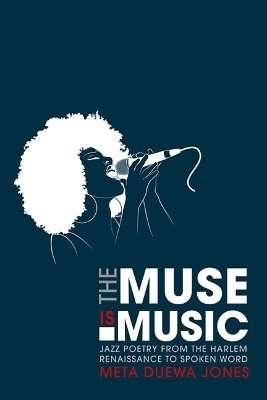
The Muse is Music
University of Illinois Press (Verlag)
978-0-252-07926-9 (ISBN)
- Titel z.Zt. nicht lieferbar
- Versandkostenfrei innerhalb Deutschlands
- Auch auf Rechnung
- Verfügbarkeit in der Filiale vor Ort prüfen
- Artikel merken
This wide-ranging, ambitiously interdisciplinary study traces jazz's influence on African American poetry from the Harlem Renaissance to contemporary spoken word poetry. Examining established poets such as Langston Hughes, Ntozake Shange, and Nathaniel Mackey as well as a generation of up-and-coming contemporary writers and performers, Meta DuEwa Jones highlights the intersections of race, gender, and sexuality within the jazz tradition and its representation in poetry. Applying prosodic analysis to emphasize the musicality of African American poetic performance, she examines the gendered meanings evident in collaborative performances and in the criticism, images, and sounds circulating within jazz cultures.
Jones also considers poets who participated in contemporary venues for black writing such as the Dark Room Collective and the Cave Canem Foundation, including Harryette Mullen, Elizabeth Alexander, and Carl Phillips. Incorporating a finely honed discussion of the Black Arts Movement, the poetry-jazz fusion of the late 1950s, and slam and spoken word performance milieus such as Def Poetry Jam, she focuses on jazz and hip hop-influenced performance artists including Tracie Morris, Saul Williams, and Jessica Care Moore. Through attention to cadence, rhythm, and structure, The Muse is Music fills a gap in literary scholarship by attending to issues of gender in jazz and poetry and by analyzing recordings of poets both with and without musical accompaniment. Applying the methodology of textual close reading to a critical "close listening" of American poetry's resonant soundscape, Jones's analyses include exploring the formal innovation and queer performance of Langston Hughes's recorded collaboration with jazz musicians, delineating the relationship between punctuation and performance in the post-soul John Coltrane poem, and closely examining jazz improvisation and hip-hop stylization. An elaborate articulation of the connections between jazz, poetry and spoken word, and gender, The Muse Is Music offers valuable criticism of specific texts and performances and a convincing argument about the shape of jazz and African-American poetic performance in the contemporary era.
Meta DuEwa Jones is an associate professor of English and African and African diaspora studies and a faculty affiliate in the Center for Women's and Gender Studies and the Center for African and African American Studies at the University of Texas at Austin.
Acknowledgments ix
Introduction 1
Riff, Remembrance, and Revision
1. Listening to What the Ear Demands: Langston Hughes on the (Jazz) Record 33
2. Jazz Prosody: The Gendered Contours of the Post-Soul Coltrane Poem 85
New Traditions, New Translations
3. Opening the Canary's Cage: Sex, Gender, and the Jazz Body 129
4. A Cave Canem Continuum or a Dark Room Renaissance? From Jazz Improvisation to Hip-Hop Stylization in Contemporary Black Poetry 167
Epilogue. "When the Muse Is Music": Collaboration and Improvisation in Jazz Poetics 209
Notes 231
Works Cited 249
Index 273
| Reihe/Serie | New Black Studies Series |
|---|---|
| Zusatzinfo | 8 black and white photographs, 2 tables |
| Verlagsort | Baltimore |
| Sprache | englisch |
| Maße | 152 x 229 mm |
| Gewicht | 426 g |
| Themenwelt | Literatur |
| Kunst / Musik / Theater ► Musik ► Jazz / Blues | |
| Geisteswissenschaften ► Sprach- / Literaturwissenschaft ► Anglistik / Amerikanistik | |
| Geisteswissenschaften ► Sprach- / Literaturwissenschaft ► Literaturwissenschaft | |
| ISBN-10 | 0-252-07926-4 / 0252079264 |
| ISBN-13 | 978-0-252-07926-9 / 9780252079269 |
| Zustand | Neuware |
| Haben Sie eine Frage zum Produkt? |
aus dem Bereich


